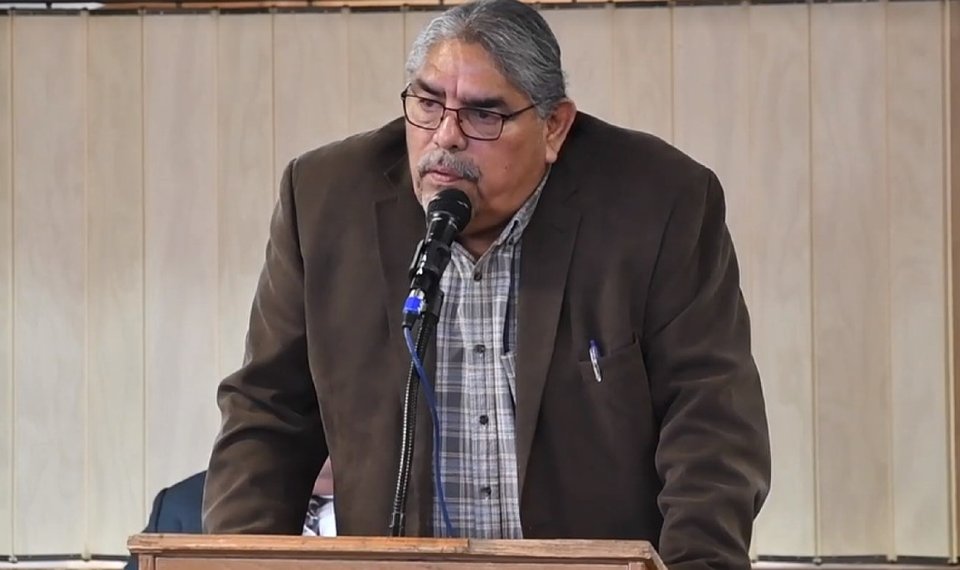
- Details
- By Lenzy Krehbiel Burton
CARNEGIE, Okla. — Impeachment proceedings are at a standstill for the Kiowa Tribe of Oklahoma after a judge issued a temporary restraining order Thursday afternoon.
Citing questions over whether due process rights were guaranteed and if COVID-19 prevention protocols would be observed, Judge Shannon Edwards with the Anadarko, Okla.-based Court of Indian Offenses granted a motion from Chairman Michael Komalty last Thursday to stop all impeachment proceedings, including deliberations, until she can hear arguments on the matter at 10 a.m. Wednesday.
However, before the restraining order was issued, the Kiowa legislature conducted a two hour hearing at Red Buffalo Hall Thursday. Citing a belief that at least one legislator had recently tested positive for COVID-19, Komalty did not attend.
Passed unanimously by the legislature in June, Komalty faces five impeachment counts, including allegations he violated the tribe’s constitution by spending CARES Act money without first getting a budget approved by the legislative branch or the Kiowa Indian Council, which is open to all Kiowas over age 18.
Adopted in 2017, the tribe’s constitution includes language that all revenue sources are part of the tribe’s budget and that the budget – or any changes to it – must be approved by Kiowa voters. The executive branch has maintained that the CARES Act money is comparable to federal grants, which it has overseen in the past.
“This is a constitutional issue,” District 2 representative Michael Primus said. “The articles of impeachment are also constitutional. Although this is a first for our tribe, this is necessary for us to follow our constitution, for us to follow our oath.”
The hearing was already postponed one week due to concerns about potential COVID-19 exposure. During the two-hour interrogation of witnesses, the seven members of the Kiowa Legislature were masked and observed social distancing with one representative per table. Furthermore, Speaker Angela McCarthy announced at the start of the proceedings that all seven members of the legislature tested negative for COVID-19.
In-person attendance was limited to 50 Kiowa citizens and masks were required.
Meanwhile, a separate injunction from the Court of Indian Offenses still remains in place preventing the tribe from spending any more of its CARES Act money until a budget is approved by the legislature and Kiowa Indian County. The executive branch has indicated it will appeal that order. About 500 applications were pending at the time the injunction was granted.
In a statement posted to YouTube Monday, Komalty acknowledged that the freeze on relief checks would create problems for the tribe’s citizens, including families that will be relying on distance learning during the upcoming 2020-2021 school year.
“Our students need laptops and printers, which we cannot provide right now,” he said. “In order for us to do that, it’ll take 130 days on the injunction to be completed. That’s too long for us to sit and suffer through this hardship that this coronavirus is doing to our tribe.”
More Stories Like This
Native News Weekly (August 25, 2024): D.C. BriefsCheyenne River Youth Project to Celebrate Women’s Strength at Barbie-Themed Passion for Fashion on March 14
Celebrating Native American Women
Native Bidaské: The Illusion of Freedom and the Myth of America 250, Leonard Peltier Speaks Out
Monday Morning (March 2, 2026): Articles You May Have Missed This Past Weekend
Help us defend tribal sovereignty.
At Native News Online, our mission is rooted in telling the stories that strengthen sovereignty and uplift Indigenous voices — not just at year’s end, but every single day.
Because of your generosity last year, we were able to keep our reporters on the ground in tribal communities, at national gatherings and in the halls of Congress — covering the issues that matter most to Indian Country: sovereignty, culture, education, health and economic opportunity.
That support sustained us through a tough year in 2025. Now, as we look to the year ahead, we need your help right now to ensure warrior journalism remains strong — reporting that defends tribal sovereignty, amplifies Native truth, and holds power accountable.
 The stakes couldn't be higher. Your support keeps Native voices heard, Native stories told and Native sovereignty defended.
The stakes couldn't be higher. Your support keeps Native voices heard, Native stories told and Native sovereignty defended.
Stand with Warrior Journalism today.
Levi Rickert (Potawatomi), Editor & Publisher
